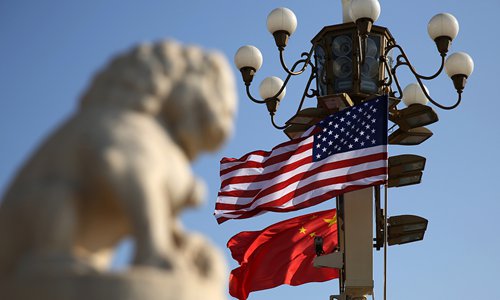HOME >> BUSINESS
China, US agree to new talks in October, facing uphill battle
Source:Global Times Published: 2019/9/5 11:54:11

Photo: VCG
China and the US have agreed to hold a new round of trade negotiations in Washington in early October. Analysts forecast that talks will continue but no deal is in sight considering Washington's bullying trade tactics.
Chinese Vice Premier Liu He had a phone call, by invitation, with US Treasury Secretary Steven Mnuchin and Trade Representative Robert Lighthizer on Thursday, during which the two sides agreed to hold the 13th round of China-US high-level trade consultations in Washington in early October, China Central Television reported on Thursday. Both sides agreed to work together and create better conditions for negotiations, the report said.
Chinese analysts, however, do not hold an optimistic view of the upcoming talks, considering the US' previous flip-flopping attitude and lack of sincerity in reaching a deal.
The US began imposing a 15-percent tax on Sunday on an estimated $125 billion of Chinese products, including clothing, footwear, sunglasses, cameras, television components, turkeys and beef cuts.
This latest round of tariffs could have been the direct trigger of the delay in trade talks, Bai Ming, research fellow at the Chinese Academy of International Trade and Economic Cooperation, told the Global Times on Thursday.
"China has always been open to conversation, but the negotiations so far have been stifled by the extreme pressure from the US and the arbitrary attitudes of the Trump administration," Bai said. "The talks will be tough."
US President Donald Trump has not stopped escalating pressure as part of his negotiation tactics. On his own Twitter account on Tuesday, he claimed that when the US wins the trade war, "The deal would get much tougher, and China's supply chain will crumble and businesses, jobs and money will be gone."
However, the Trump administration is also facing increasing pressure from its customers and companies, considering major US economic indicators have been slumping in recent months, putting more pressure on the Trump administration to reach a deal.
"The US customers and exporters are paying for the Trump administration's decisions," Bai said. "As the trade war drags on, the US government will face more pressure from its own people."
The US manufacturing PMI fell into contraction at 49.1 in August amid the trade war, its lowest level in more than three years, CNBC reported on Tuesday. And the yield curve of the US Treasury is also inverted - a sign that is among the most consistent indicators of an economic recession.
Global Times
RELATED ARTICLES:
Posted in: ECONOMY